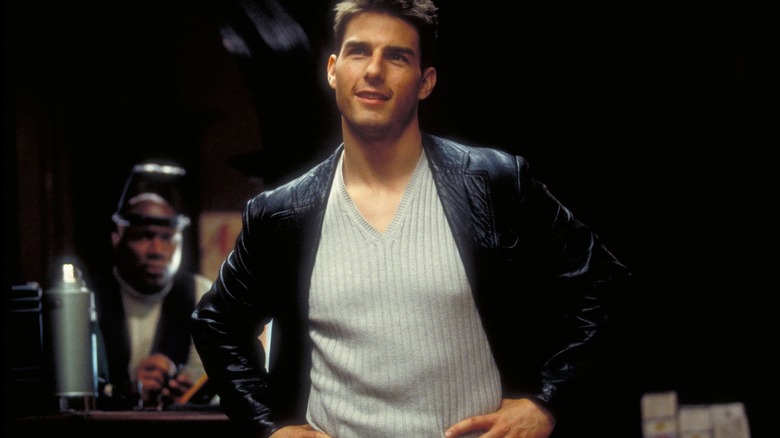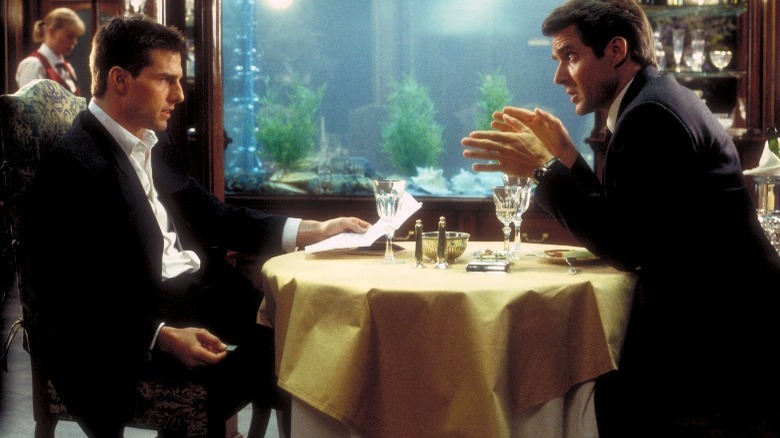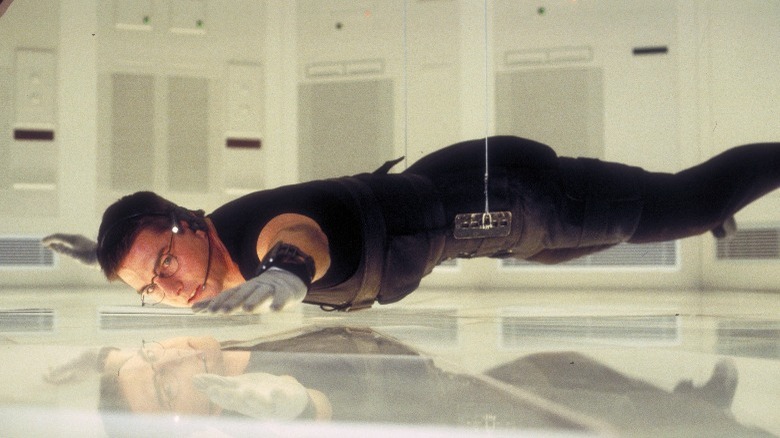Mission: Impossible Director Brian De Palma Was Against Making Any Sequels
The first "Mission: Impossible" is a quintessential Brian De Palma spy-thriller, sporting a tense, twisty mystery about a man being wrongfully framed. At this stage, "Mission: Impossible" had no franchise aspirations attached to it, as De Palma intended it as a standalone foray into a world of spies and high-stakes missions, with layered characters enriching an already-thrilling tale. Now, 27 years later since the first "Mission: Impossible" movie, Ethan Hunt (Tom Cruise) has evolved into a franchise brand in his own right, with the series' seventh installment, "Mission: Impossible – Dead Reckoning Part One" just around the corner. Hunt has come a long way from stumbling around traumatized in the streets of Prague — now, he jumps off tall buildings without a care in the world and neutralizes global threats with growing zest and determination.
In an age where franchises are an inevitability, De Palma's thoughts on "Mission: Impossible" sequels and Hollywood preoccupation with CGI tentpole films might elicit divided responses. In an interview with AP Press, De Palma lamented the state of Hollywood in the present, stating that most films are "just lit terribly" and that "visual storytelling has gone out the window." De Palma is not completely wrong — an over-reliance on CG often ends up sidelining visual intricacy or the basic concept of well-lit shots, but there is no dearth of competent filmmakers who can balance the two and create stunning, riveting films that truly matter.
However, De Palma's comments about the obsessive need to churn films out for the sake of profits are not exaggerated or untrue. Some franchises have endured over time, but a majority of franchise films end up being underwhelming or forgettable, with nothing meaningful to offer. But, does this apply to the "Mission: Impossible" franchise? Let's dive into what the director had to say.
'One of these is enough'
In the same interview with AP Press, De Palma talked about the growing trend of film franchises that extend way beyond story needs to keep the money rolling, and he expressed similar sentiments about the evolving "Mission: Impossible" franchise." According to the director, when Cruise approached him for a sequel immediately after, he was quick to refuse:
"Stories, they keep making them longer and longer only for economic reasons. After I made 'Mission: Impossible,' Tom asked me to start working on the next one. I said: 'Are you kidding?' One of these is enough. Why would anybody want to make another one? Of course, the reason they make another one is to make money. I was never a movie director to make money, which is the big problem of Hollywood. That's the corruption of Hollywood."
While De Palma sees little appeal in a blockbuster franchise like "Mission: Impossible," it is tough to argue against the fact that both the box office and everyday audiences are eager for more installments to come. Yes, the franchise has proven to be extremely lucrative from an economic standpoint, but these movies excel at entertaining a wide demographic, with Cruise at the center of such a dazzling spectacle. Now that the franchise has cemented its identity as one that raises the stakes with each entry with death-defying stunts, the hype surrounding "Mission: Impossible" films is at an all-time high. Whether this can be attributed to the genuine thrill of blockbuster moviemaking or a by-product of "the corruption of Hollywood," demands a more nuanced conversation that takes several factors and perspectives into consideration.
Whether you agree with De Palma or not, his "Mission: Impossible" undoubtedly laid the foundation for the megablockbuster franchise we know and love today.
De Palma's film is the blueprint
When you revisit 1996's "Mission: Impossible," it is easy to spot the amalgamation of influences that have evolved into the franchise's trademarks over the years. De Palma infuses Hunt with complexity from the get-go — he is no hardened IMF officer who just barrels through every situation, but a sympathetic character with enough groundedness to root him in a world where fish tanks in restaurants blow up due to a pack of exploding gum. There are elements of noir, depicted skillfully with split diopter shots and Dutch angles, as Hunt slowly unravels the conspiracy surrounding his wrongful framing. The sequels continue this character tradition in simpler, more palatable ways, where Hunt is often at odds with himself and has to literally don many masks to pursue some MacGuffin or other.
Moreover, audacious stunts and action set pieces have always been an intrinsic part of the franchise, and De Palma was the one to call Cruise and suggest the kinetic train sequence where Hunt jumps atop a fast-moving train and crashes an enemy helicopter. Also, it is impossible (no pun intended) to talk about the first entry without the tense, gripping vault scene (which was also De Palma's idea), variations of which have been played out in successive installments. Hunt might be the danger-loving maniac we know and love today, but the seeds of these innate tendencies were planted in De Palma's film.
Whether "Dead Reckoning Part One" manages to elevate the franchise further remains to be seen. However, even if the new installment fails to match up to expectations, the franchise has had a great run so far, and ironically, we have De Palma to thank for that.
"Mission: Impossible – Dead Reckoning Part One" hits theaters on July 12, 2023.


